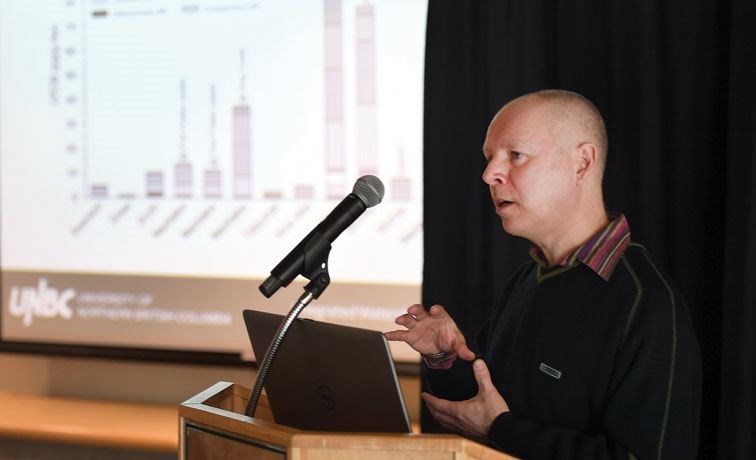A group of UNBC researchers will be studying the impacts of climate warming on the Nechako River Basin, thanks to a $1 million grant from the province and the mining multi-national Rio Tinto.
Researchers with the integrated watershed research group announced the funding on Tuesday at UNBC. The researchers - environmental science professors Stephen Dry and Phil Owens, geography professor Ellen Petticrew, and Canada Research Chair in Health, Ecosystems and Society Margot Parkes - received a $499,950 grant from the Ministry of Forests, Lands, Natural Resources Operations & Rural Development and Rio Tinto.
These funds will be matched by another source, and granted to the Nechako Environmental Enhancement Fund (NEEF).
The research will form the second phase of the research group's work. The first phase examined the impact of climate change and water security, sediment sources and dynamics, and developed digital tools to help inform decision-making in the watershed.
The researchers found that temperatures warmed by approximately 2 C between 1950 and 2010 across the watershed.
"In Phase Two, we will address the role of observed climate change and flow regulation on streamflow volumes and water temperatures in the Nechako River," Dry said.
"We're very grateful today to be receiving the second phase of research funding to continue our work in the Nechako watershed. It is a very large system. It's over 45,000 square kilometres. It's bigger than Switzerland."
A poster display prepared by the researchers stated that the between 2010-2050, researchers expect maximum mean air temperature will increase by 3.19 degrees Celsius.
"By the 2080s, the (Nechako River Basin) may shift from a snowmelt to a hybrid or rainfall-dominated system," the poster display said.
"There is a lot of concern about climate change and how it's affecting water resources and water temperatures, for instance in salmon and light sturgeon and their migrations. So these are key issues in the watershed that we are now able to address with this second phase of activity," Dry said.
When asked about the impact of industry on the Nechako River Basin, Dry said the research will inform the work of resource industry players, such as Rio Tinto, one of the funders of the research.
"We were concerned about, for instance, flow regulation. Obviously, we have the releases of water at Skins Lake and how that's influencing the downstream hydrologies," Dry said.
The Skins Lake Spillway, operated by Rio Tinto, releases a large volume of water into the Nechako Watershed.
Rio Tinto has been a longtime funder of NEEF. The mining company agreed to establish and contribute, on a matching-dollar basis, up to $50 million to the NEEF as part of a 1997 agreement with the province.
In order to provide applications for the research, the UNBC research team has also be working with graduate students to develop web-based mapping applications that will document their research.
The group hopes to create web-based tools that will provide "a single point of access to information that is relevant to the Nechako River Basin," according to the integrated watershed research group website.



